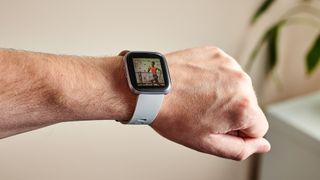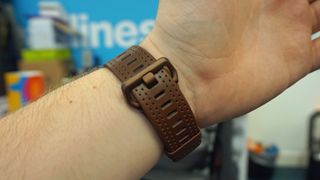You need to get your music library onto your Fitbit while you still can
Fitbit will no longer be able to sync music in October

Fitbit announced that it will discontinue the ability to sync your wearable device with PC and Macs, preventing users from downloading their own music from their computers onto their devices.
Fitbit has declared it will kill the feature on October 13, writing on its site that “we're removing the option to sync your Fitbit device with the Fitbit Connect app on your computer. Download and use the Fitbit app on your phone to sync your device.”
So, how do you import your own music onto your best Fitbit without doing it the old-fashioned way, with a cable and your computer? The short answer is: you don’t.
Fitbit writes on its help page for music and podcasts that “On October 13, 2022, we're removing the option to transfer playlists to your Fitbit watch through your computer. You can continue to play personal music stored on your watch and transfer music to your watch with the Deezer app and Pandora app.”
These apps don’t exactly have the largest user bases, so it seems like a really short-sighted move to drive people toward subscribing to yet more streaming services and subscriptions in order to access basic functions of your watch ad-free, as if paying for Fitbit Premium wasn’t already enough. How many paywalls can one wearable reasonably expect people to bypass, in addition to buying the tracker itself?

However, I believe Fitbit’s going to be working on this very soon. Anyone who’s been following Fitbit closely over the last few years knows it’s been acquired by Google, and there’s a slate of new devices (thought to be the Fitbit Sense 2, Inspire 3, and Fitbit Versa 4) on track for release very soon.
Even though they’re very unlikely to be true Wear OS watches, they could at least have offline Spotify and YouTube Music enabled, covering a wide range of streaming services so you can at least get your music somewhere.
Get daily insight, inspiration and deals in your inbox
Get the hottest deals available in your inbox plus news, reviews, opinion, analysis and more from the TechRadar team.
If you’re a Fitbit owner with an older device, who enjoys listening to your music library on the device, you’ve got two months to stuff that thing with as many songs as it’ll hold before the cutoff point on October 13. Fitbit will not delete your existing library of songs, but it will disable Fitbit Connect on this date, the software application that allows you to connect your device to the computer.
Fitbit's obviously got its reasons for doing this, and it must have gleaned from the data its devices collects that more people use streaming services on its devices than listen to music natively. I don't know how large of a section of the Fitbit userbase downloads their own songs onto their watch, but I suspect not a very big one. It's likely with new devices on the horizon, it's hustling to adopt a new status quo.
Even so, it's going to annoy some long-term users at a time when Fitbit just can’t seem to get out of its own way. Even though we can’t wait to see Fitbit’s new devices in September, between issues with the Charge 5, the headline-grabbing Ionic recall, its terrible graph update that convinced its users they had sleep apnea, and now this, the wearables manufacturer certainly appears to be having some technical issues at the moment.
We hope these are just teething problems caused by Alphabet’s acquisition of the brand, rather than long-term issues. Otherwise, the most popular name in fitness tracking is about to have another bad year.

Matt is TechRadar's expert on all things fitness, wellness and wearable tech. A former staffer at Men's Health, he holds a Master's Degree in journalism from Cardiff and has written for brands like Runner's World, Women's Health, Men's Fitness, LiveScience and Fit&Well on everything fitness tech, exercise, nutrition and mental wellbeing.
Matt's a keen runner, ex-kickboxer, not averse to the odd yoga flow, and insists everyone should stretch every morning. When he’s not training or writing about health and fitness, he can be found reading doorstop-thick fantasy books with lots of fictional maps in them.
